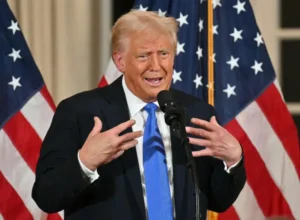
President Donald Trump has reiterated his intention to seek a third term in office, stating that he is “not joking” about the possibility, despite constitutional limitations restricting U.S. presidents to two terms.
In a recent interview with NBC News, Trump suggested that there are potential legal pathways to extend his presidency, hinting at strategies that could allow him to remain in power beyond the traditionally allowed eight years. One possibility reportedly being explored is having Vice President JD Vance run for president, with Trump as his running mate. Under this scenario, Vance could resign after taking office, enabling Trump to assume the presidency once again.
Legal analysts have pointed out that any attempt to secure a third term would face significant constitutional and political challenges. The 22nd Amendment to the U.S. Constitution explicitly prohibits a president from serving more than two terms, and any change would require a constitutional amendment—a process requiring approval from two-thirds of Congress and ratification by three-fourths of the states, an unlikely scenario in the current political climate.
Trump’s remarks have sparked debate among political observers, with critics warning that such a move could undermine democratic principles and set a dangerous precedent for future administrations. However, Trump has maintained that there is strong public support for his continued leadership.
While no official steps have been taken toward a third-term bid, Trump’s comments have reignited discussions on executive power limits and the stability of U.S. democratic institutions as the 2028 election approaches.




